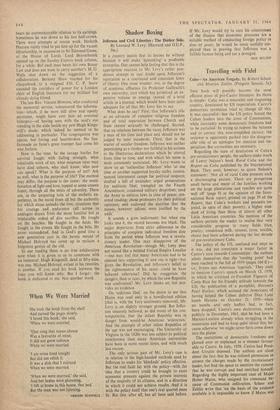Shadow Boxing
IF a country insists that its heroes be without blemish it will make `dgbunking' a profitable enterprise. One cannot help feeling that this is the appropriate reaction to Mr. Levy's rather pon- derous attempt to cast doubt upon Jefferson's reputation as a convinced and consistent lover of liberty. One must wonder, too, at the degree of academic affluence (in Professor Galbraith's own university, too) which has permitted an ex- pensive volume to emerge instead of a brief article in a journal, which would have been quite adequate for all that Mr. Levy has to say.
What does he say? First, that Jefferson's role as an advocate of complete religious freedom and of total separation between Church and State cannot seriously be challenged. Second, that on relations between the races, Jefferson was a man of his time and place and should not be judged by later standards. Third, that in the matter of secular freedom, Jefferson was neither penetrating as a thinker nor faithful in his actions to the libertarian declarations which he uttered from time to time, and with which his name is most commonly associated. Mr. Levy wants to show us an 'unfamiliar Jefferson' who 'at one time or another supported loyalty oaths; counte- nanced internment camps for political suspects; drafted a bill of attainder; urged prosecutions for seditious libel; trampled on the Fourth Amendment; condoned military despotism; used the Army to enforce laws in time of peace; cen- sored reading; chose professors for their political opinions; and endorsed the doctrine that the means, however odious, were justified by the ends.'
It sounds a grim indictment; but when one looks into it, the record becomes less black. The major departures from strict adherence to the principles of complete individual freedom date from the period when Jefferson was a revolu- tionary leader. One may disapprove of the American Revolution—though Mr. Levy does not sound like a belated United Empire Loyalist —one may feel that many Americans had to be coerced into supporting it; and one is right—but given the Revolution, and Jefferson's belief in the righteousness of his cause, could he have behaved otherwise? Did he exaggerate the dangers, then or later, by which the new Republic was confronted? Mr. Levy thinks so; but pro- vides no evidence.
On 'seditious libel,' on the desire to see that Hume was read only in a bowdlerised edition (that is, with the Tory sentiments removed), Mr. Levy is on slightly stronger ground. But Jeffer- son sincerely believed, as did many of his con- temporaries, that the infant Republic was in danget from would-be American 'aristocrats.' And the example of other infant Republics of the age was not encouraging. The University of Virginia in the 1820s was less subject to political interference than many American univertities have been in more recent times, and with much less excuse.
The only serious part of Mr. Levy's case is in relation to the high-handed methods used by Jefferson to make his `blockade' policy effective. But the real fault lay with the policy—with the idea that a country could be brought to exert economic pressure against the private interests of the majority of its citizens, and in a direction in which it could not achieve results. And it is with the policy itself that one's real quarrel must lie. But this, after all, has all been said before. If Mr. Levy would try to cure his countrymen of the illusion that economic pressures are a suitable method of conducting foreign policy in time of peace, he would be more usefully em- ployed than in proving that Jefferson was a fallible human being and not a demigod.
MAX BELOFF






































 Previous page
Previous page